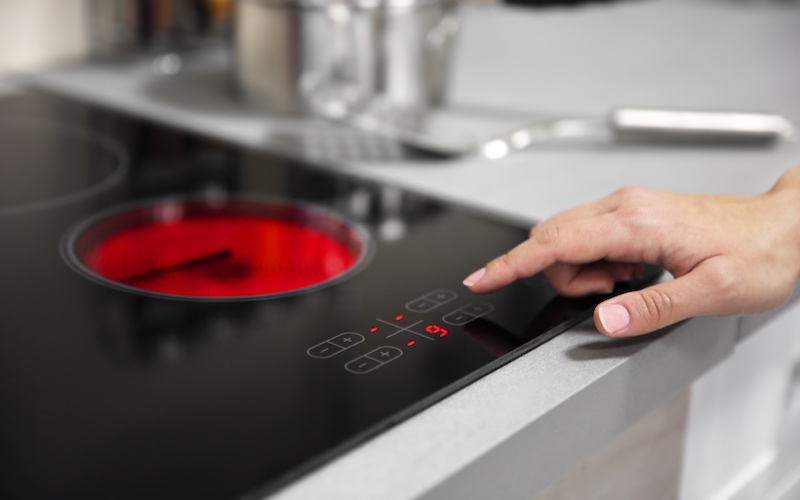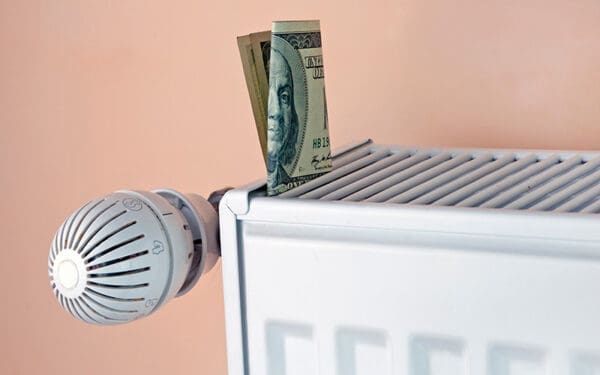
A Consumer Reports comparison shows that electric stoves outperform gas stoves. Photo: Shutterstock
By now, we’ve all heard the bad news about gas stoves: They’re not good for our climate or our health.
In fact, each time we switch on that flickering blue flame, we send toxic nitrogen dioxide (NO2) into our homes. That polluted air irritates eyes and respiratory tracts. Gas stoves have been tied to an increased risk of childhood asthma, as well as health risks for those who are elderly or pregnant. Even when turned off, gas stoves constantly leak cancer-causing chemicals like benzene. And that’s the stuff we’re breathing in all day, every day.
Of course, there are the larger realities of what natural gas is doing to our climate, too. This polluting fuel requires a complex and very dirty infrastructure that begins with underground drilling and fracking and continues with pipelines crisscrossing the country. It ends when the noxious, dangerous gas gets piped directly into our homes. All along the way, methane gets spewed into the air where it damages our climate. And that damage leads to, among other problems, the extreme weather that we’ve all seen on the rise in recent years.
If this sounds like a system you don’t want to be a part of, you may be thinking about going electric next time you need to replace your stove. But if you’re feeling some hesitation, you’re not alone. Right now, the gas industry is trying to convince us that electric stoves are inferior to gas stoves. And what about that old saying, “now we’re cookin’ with gas?” (That slogan, by the way, dates to the 1930s and was cooked up by the natural gas industry.) So, are electric stoves really the path forward?
Yes. And here are a few facts that make electric stoves sizzle with potential.
Electric Stoves Perform Better
When the heat is on, it turns out electric stoves outperform gas stoves, according to a recent Consumer Reports review. The organization compared electric smooth top ranges with gas stoves, and found “in most cases, electric ranges have a serious leg up on the performance of gas ranges.”
For one, electric ranges heat up more quickly. What’s more, they were found to simmer more consistently than gas stoves. And any cook worth their sauce knows that an erratic simmer can really mess with a caramel glaze.
In their research, Consumer Reports also found that broilers on electric stoves outperformed gas broilers. More than half of electric ranges earned a rating of “very good” or better. On the other hand, only about 15% of gas broilers earned a rating that high.
When it comes to baking, Consumer Reports found electric and gas stoves in a virtual dead heat.
So you see, based on performance alone, there’s no reason to keep cooking with gas. And, with the Inflation Reduction Act offering rebates on new electric cooking appliances, this is the perfect time to go electric. Plus, next time you bake cookies, you won’t also be baking up a higher risk of asthma for your kids.
When it comes to types of electric stoves, probably the cleanest and most energy-efficient solution is the vaunted induction range. These ranges are 5 to 10% more energy-efficient than conventional electric stoves (and about three times more efficient than gas stoves). An induction cooktop uses electromagnetism to heat cookware, essentially turning a pan into its own source of heat. The highly efficient system allows for a rapid rise or drop in temperature. Plus, induction stoves are inherently safe. If you forget to turn it off or there’s no pot, nothing gets hot. Food cooks faster and induction cooktops are easier to clean. But they’re also more expensive up front than conventional electric models. Fortunately, prices have dropped, and the Inflation Reduction Act is giving rebates for purchasing them, too.
If the idea of an induction range is out of the question or you’re a renter, so can’t choose your stove, there’s a third option: for a reasonable sum, you can buy a portable induction burner. It’s a simple and affordable way to reduce your gas consumption and clear the air at home.
Your Electricity Needs to be Clean
Okay, so the Consumer Reports rating may have convinced you to go electric. But that’s not the full story. While electric stoves are cleaner when it comes to indoor pollution, the truth is that they do consume more energy than gas stoves. And, many of us still have no choice but to get our electricity from dirty sources.
If you can, make sure the electricity you’re using comes from clean sources. If you don’t know, you can check with your local utility. In general, at least 50% of electricity customers have the option to purchase renewable electricity directly from their power supplier. If you don’t, you usually have the option of purchasing renewable “green power” or “clean power” energy certificates. Also, make sure your new stove has earned a high energy-efficiency rating from Energy Star.
If you can’t make the switch to cleaner energy sources – but still want to ditch your gas stove – don’t let our current dirty energy system stop you. Instead, help CLF and our allies push for more clean energy on the grid, which will help us get off of fossil fuels for good and make electricity more affordable for all of us. That means helping us urge the region’s elected officials and decision-makers to put more climate laws and policies on the books – and implement them too. Your voice can protect our health and climate.
Food For Thought: We’ve Got Bigger Fish to Fry
When it comes to pollution, climate change, and carbon emissions, there are admittedly bigger fish to fry than gas stoves. On an individual level, you’ll make a much bigger dent in your carbon footprint by electrifying your home heating system and exchanging a gas-guzzling car for an electric vehicle, or better yet, hopping on public transit. But to truly turn down the heat on climate change, we must all work together to push for solutions at the systemic level. We need to replace polluting gas power plants with renewable clean energy sources like wind and solar. We need public transit that functions. We also need electric vehicles we can afford.
No, switching to an electric stove alone will not solve our climate problems. But if you opt to go electric, you may find some relief in knowing that finally, you’re not cooking with gas.
This is part of an occasional series revealing the truth on environmental topics.



